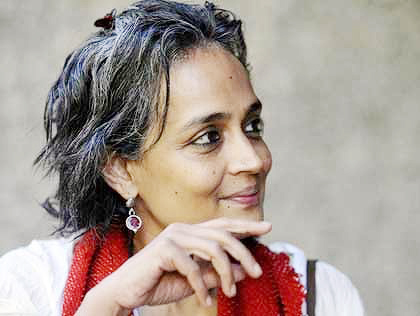Savouring the flavours tasted by the characters leaping through the pages as you flip, the aromas waft through your nostrils in waves from the black letters on white paper, feeling the pinch on your skin, the graze on your finger tips, the anger in your heart and the joy in your step, Arundhati Roy not only paints a verbal picture with her words, she stimulates the senses and pitches you in the middle of her story — not only as a bystander, but as each character in turn — feeling, tasting, reeling and recoiling. She has used her gift for writing not only for fiction but for a series of political essays and enlightening works that view urban development and so-called ‘prosperity’ in the glaring light of truth.
In her debut and only work of fiction, The God of Small Things, within the folds of a fictitious story lies the truth, because Arundhati believes fiction is truth. In the book, she explores with a remarkable play of words and insightful characters, caste disparity entrenched so deeply into a society it flows like blood in their veins.
Arundhati has become the voice of India’s indigenous minority — the adivasi. Shunning the assertions of economic growth and prosperity in the country, Arudhati claims the growth is at the cost of driving burgeoning masses below the poverty line. The hefty burden of growth and development is placed in the frail shoulders of India’s population — threatening their existence.
Arundhati’s voice is a protest against Western capitalism that is robbing the country of its resources and paying no royalty to the resources rich land inhabitants. Terming optimistic government statistics as untrue, Arundhati, often accused of maligning the country’s reputation, is an active and vocal part of several local bodies protesting the building of dams that will displace millions, pushing them further into an abyss of crushing poverty while making way for expanding industries.
To claims that poverty has been halved in India in recent years, she refutes the claims calling the voice of democracy a false voice and the emerging economic prosperity a lie, as 800 million people are still living on less than 30 cents a day.
Urging to redefine the concept of modernity as the current system elevates the elite classes, lording over the indigenous community, they eye with avarice their resources, powering their aluminium factories with water from their rivers and feeding it bauxite from their mountains — leaving them barren. Un-accepting of a ‘different kind of modernity’, the government has termed the protectors of their own land insurgents, launching a military operation against the poorest of the country. Linking corporate globalisation with terrorism, bigotry and despair she has accused the government of branding the exploited insurgents and launching a military operation against them which she believes is a gross violation of their own constitution.
As Arundhati says, “If you’re an adivasi living in a forest village and 800 CRP (Central Reserve Police) come and surround your village and start burning it, what are you supposed to do? Are you supposed to go on hunger strike? Can the hungry go on a hunger strike? Non-violence is a piece of theatre. You need an audience. What can you do when you have no audience? People have the right to resist annihilation.”






